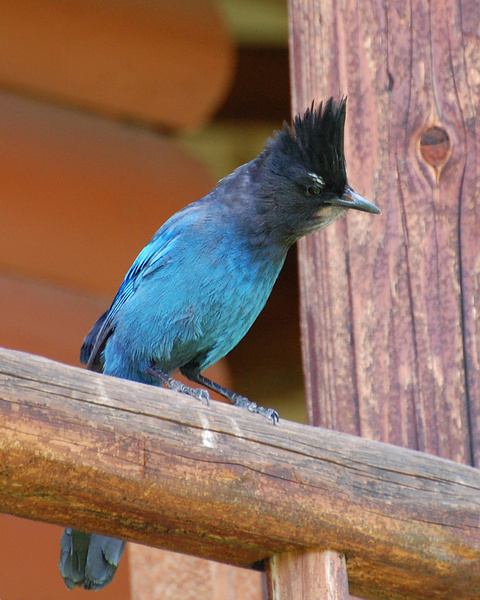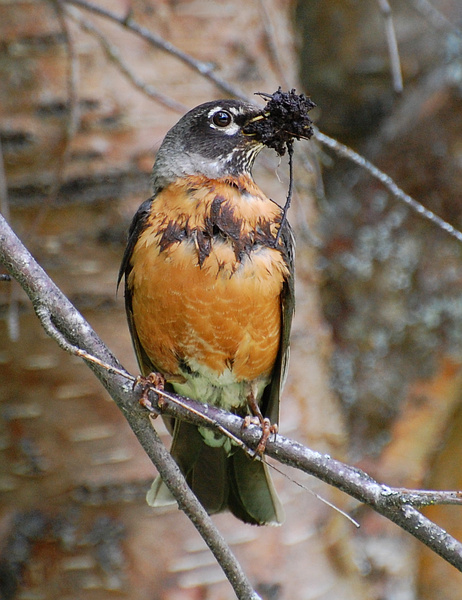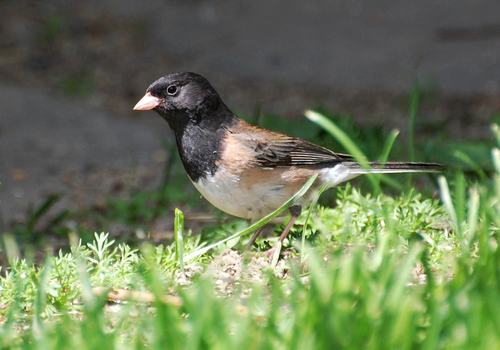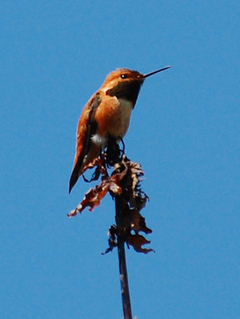
Okanagan Vacation 14 - Chute Lake
July 1st, 2011
Our final outing took us up to Chute Lake resort, where I was pleased to find a well-patronized set of bird feeders. One of the patrons was a Steller's Jay. The feeders themselves were hidden behind greenery, but I could catch him on camera as he perched on the lodge waiting his turn.

1680x1050 wallpaper
The woods along Chute Lake Road had been severely burned by forest fire in 2003. This was to thank for one of my lifers of the trip--a bird which, believe it or not, considers burned woods to be ideal habitat! Olive-Sided Flycatchers like open areas with abundant dead trees. They use the dead trees as hunting perches, and the openness of the habitat means they can easily see the flying insects on which they prey.
There are a number of "fire follower" species, a few of whom would even go extinct if humans successfully suppressed all forest fires (and didn't do planned burns.) The Kirtland's Warbler requires stands of young Jack Pine for nesting. Jack Pine cones open and release their seeds only when the resin that seals them shut is melted by intense heat--say, heat from a forest fire. Without fire, the Kirtland's Warbler's habitat disappears. There are only a few thousand of them left in the world.

There's a story behind this robin. You could call her "the Varied Thrush that wasn't." Varied Thrush is a unique species of western Canada that looks somewhat like a robin with a dark band across the breast. So when Mike said he'd seen a robin with a breast band, I perked up instantly.
But when I saw the bird for myself, what I saw was indubitably a robin...she had the calls of a robin, the eye ring of a robin (as opposed to the Varied Thrush's orange eye stripe), and the tameness of a robin. She blithely disregarded us as she flew back and forth building her nest on a low pine branch. I was forced to conclude that the dark breast band which had gotten me so excited was either an aberration or (as occurs to me now) it was mud--she had simply dirtied herself up in the process of nest-building.

The Oregon Juncos foraging below the resort feeders were somewhat more amenable to the camera than the ones on Mount Kobau had been.
There was a hummingbird feeder at the resort as well, and it was thanks to that I got my 40th and final lifer of the trip: an eensy-weensy Rufous Hummingbird.

July 1st, 2011
Our final outing took us up to Chute Lake resort, where I was pleased to find a well-patronized set of bird feeders. One of the patrons was a Steller's Jay. The feeders themselves were hidden behind greenery, but I could catch him on camera as he perched on the lodge waiting his turn.

1680x1050 wallpaper
The woods along Chute Lake Road had been severely burned by forest fire in 2003. This was to thank for one of my lifers of the trip--a bird which, believe it or not, considers burned woods to be ideal habitat! Olive-Sided Flycatchers like open areas with abundant dead trees. They use the dead trees as hunting perches, and the openness of the habitat means they can easily see the flying insects on which they prey.
There are a number of "fire follower" species, a few of whom would even go extinct if humans successfully suppressed all forest fires (and didn't do planned burns.) The Kirtland's Warbler requires stands of young Jack Pine for nesting. Jack Pine cones open and release their seeds only when the resin that seals them shut is melted by intense heat--say, heat from a forest fire. Without fire, the Kirtland's Warbler's habitat disappears. There are only a few thousand of them left in the world.

There's a story behind this robin. You could call her "the Varied Thrush that wasn't." Varied Thrush is a unique species of western Canada that looks somewhat like a robin with a dark band across the breast. So when Mike said he'd seen a robin with a breast band, I perked up instantly.
But when I saw the bird for myself, what I saw was indubitably a robin...she had the calls of a robin, the eye ring of a robin (as opposed to the Varied Thrush's orange eye stripe), and the tameness of a robin. She blithely disregarded us as she flew back and forth building her nest on a low pine branch. I was forced to conclude that the dark breast band which had gotten me so excited was either an aberration or (as occurs to me now) it was mud--she had simply dirtied herself up in the process of nest-building.

The Oregon Juncos foraging below the resort feeders were somewhat more amenable to the camera than the ones on Mount Kobau had been.
There was a hummingbird feeder at the resort as well, and it was thanks to that I got my 40th and final lifer of the trip: an eensy-weensy Rufous Hummingbird.

| ← | → |
